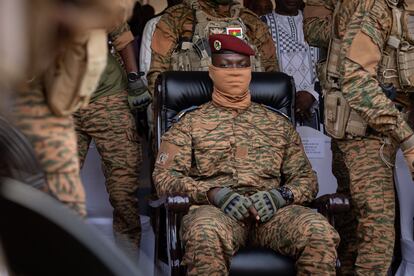‘French army out!’: Moscow gains weight in West Africa as a new military ally
The jihadist advance in Burkina Faso and Mali has triggered a strong anti-colonial sentiment that is spreading throughout the Sahel region and being used by Russia


In Ouagadougou, the capital of Burkina Faso, thousands of citizens could be seen demonstrating at the Place de la Nation on January 20 to show support for the military junta of Captain Ibrahim Traoré and his recent decision to expel the French military from the country. Russian flags and photos of Russian President Vladimir Putin were on prominent display along with national flags and placards reading “French army out of our country!” There was a feeling of euphoria in the air.
In just under a year, French troops have been expelled from two countries that are key to France’s security strategy in the Sahel region: Mali last summer and Burkina Faso this month. But this is just the tip of the iceberg of a much broader anti-French sentiment sweeping the region. Paris’s once-glorious influence in West Africa is faltering as Moscow emerges as a military ally of choice.
“We are very disappointed with France. If they wanted to, in two days they could put an end to terrorism in the region, but all this violence is in their own interest to keep us under their yoke,” says Yéli Monique Kam, coordinator of the M30 Naaba Wobgo citizen movement. “Everything is controlled by Paris or by French companies: cooperation, currency, aviation and even our biometric data, and meanwhile our population remains mired in misery. Enough is enough,” she adds vehemently. The collective, which bears the name of the last Mossi king who opposed the former metropolis, has published its “decolonization plan,” which includes rejecting French cooperation and even banishing the French language from the educational system.
The regime of Captain Traoré, who came to power after a coup d’état on September 30, has already complied with the first two points of this plan, much to popular delight: he has expelled the French ambassador, Luc Hallade, and ordered the departure of the 400 soldiers of the French Special Forces based in Kamboinsin, near the capital, a measure that will take place this month. Questioned by the military hierarchy, which views him as an opportunist, the young head of state is relying on what he himself calls “the conscious youth,” a euphemism for the enormous popular support he enjoys. “If they have the idea to overthrow him by force, we will not take it lying down,” warns Kam. “A street revolutionary will come to power in his place. We are willing to die, we are the sacrificial generation.”
Diversify alliances to stop terrorism
At the root of popular unrest is the failure of the former Burkinabe authorities and their French military allies to stop the advance of jihadism, which now controls more than half of the territory. Just hours after he had taken power, Captain Traoré announced his intention to diversify his alliances to confront terrorism, opening the door to a closer collaboration with Russia, his main provider of arms and military vehicles. This rapprochement has materialized in recent months with a visit to Moscow by Prime Minister Kyélem Appolinaire de Tambèla, and numerous other gestures of complicity. But for now Traoré has not crossed the red line that the West marked in neighboring Mali: the arrival of mercenaries from the private company Wagner, with close ties to the Kremlin.
“I doubt they will bring in Wagner’s people. It could happen, but Burkina Faso is not Mali, the people here are very proud of their sovereignty,” says a source specializing in security issues. Two weeks ago, Captain Traoré himself joked in an interview with Burkinabe Radio Television (RTB) about the alleged presence of Russian mercenaries in the country, asking where they were. “That rumor has been created so that everyone will stay away from us. But when the country finds itself in this blockade situation, endogenous solutions must be developed. Wagner? We already have our Wagners, the volunteers we are recruiting are our first Wagners,” he assured.
The enlistment of 50,000 civilians to fight side by side with the army and the introduction of new resources, such as drones and helicopters, reinforce the government thesis that since November an offensive has been underway against jihadist groups with ties to Al-Qaeda and Islamic State. But this has caused a change in strategy for the terrorists, who have now targeted the Volunteers for Homeland Defense (VDP), whose training and equipment are still deficient. The last two terrorist attacks, last Thursday and Sunday, caused 19 deaths, including nine civilian volunteers.
In neighboring Mali, however, authorities have decided to go down the path of military cooperation with Russia to replace the French troops that were expelled last summer. The presence of some 1,400 Wagner mercenaries, especially in the center of the country and in the Gao and Ménaka regions, is already being felt. These contractors have been participating in joint operations with the Mali army, sometimes causing numerous civilian casualties. UN experts recently called for an independent investigation into war crimes and crimes against humanity committed by these troops, in particular the Moura massacre in which some 300 people were killed in March 2022. Malian authorities responded by expelling Guillaume Ngefa, head of Human Rights of the UN mission in Mali (Minusma).
Lavrov visits Africa
A week ago, Russian Foreign Minister Sergei Lavrov met in Bamako, the capital of Mali, with the interim president, Colonel Assimi Goïta, and guaranteed him “the necessary support” to improve the capacity of his armed forces, both in terms of equipment and training. After the meeting, Lavrov took the opportunity to accuse the West of maintaining “neocolonial instincts” in Africa. The growing Russian involvement in the country and the expulsion of the French troops, some of which have been moved to neighboring Niger, has caused Germany, one of the main suppliers of troops to the UN mission Minusma, to announce its complete withdrawal in 2024.
“Russia’s move is clear,” warns a European diplomat. “It is repositioning itself in Africa on the memory of Soviet support for young African nations, and gaining access to important natural resources. On the other hand, faced with the isolation it is suffering from the West due to its invasion of Ukraine, Russia is using grain diplomacy, arms sales and military support to conquer markets and win over allies.”
Lavrov’s visit, his second to Africa this year, also took him to Mauritania and Sudan, in another sign that Africa is high on Moscow’s foreign policy agenda. All eyes are on the next Russia-Africa summit to be held at the end of July in Saint Petersburg, a new step in a strategy that will serve to measure Putin’s growing influence in the region.
The anti-French sentiment that is encouraging the military regimes in Mali and Burkina Faso to turn to Russia is also simmering in other countries in the region, such as Niger, which has become the new reference center for Europe’s defense strategy and fight against irregular migration in the Sahel region. This sentiment is also on display in Guinea, under the leadership of Colonel Mamady Doumbouya, and even in the historically pro-French Ivory Coast and Senegal. In the latter country, Ousmane Sonko, the main opposition candidate to the current president, Macky Sall, looks set to present a stiff battle at the February 2024 presidential elections as he, too, galvanizes his followers with anti-colonial rhetoric.
The existence of pro-Russia propaganda and activists throughout the region points to an agitation network on the Kremlin’s payroll. But the problem is much deeper. “It is a question of sovereignty, of raising awareness,” says Yéli Monique Kam. “Or is it that these pro-Russian activists are responsible for the fact that France has done nothing but loot us for decades? Are a few individuals fooling us all?”
Sign up for our weekly newsletter to get more English-language news coverage from EL PAÍS USA Edition
Tu suscripción se está usando en otro dispositivo
¿Quieres añadir otro usuario a tu suscripción?
Si continúas leyendo en este dispositivo, no se podrá leer en el otro.
FlechaTu suscripción se está usando en otro dispositivo y solo puedes acceder a EL PAÍS desde un dispositivo a la vez.
Si quieres compartir tu cuenta, cambia tu suscripción a la modalidad Premium, así podrás añadir otro usuario. Cada uno accederá con su propia cuenta de email, lo que os permitirá personalizar vuestra experiencia en EL PAÍS.
¿Tienes una suscripción de empresa? Accede aquí para contratar más cuentas.
En el caso de no saber quién está usando tu cuenta, te recomendamos cambiar tu contraseña aquí.
Si decides continuar compartiendo tu cuenta, este mensaje se mostrará en tu dispositivo y en el de la otra persona que está usando tu cuenta de forma indefinida, afectando a tu experiencia de lectura. Puedes consultar aquí los términos y condiciones de la suscripción digital.








































